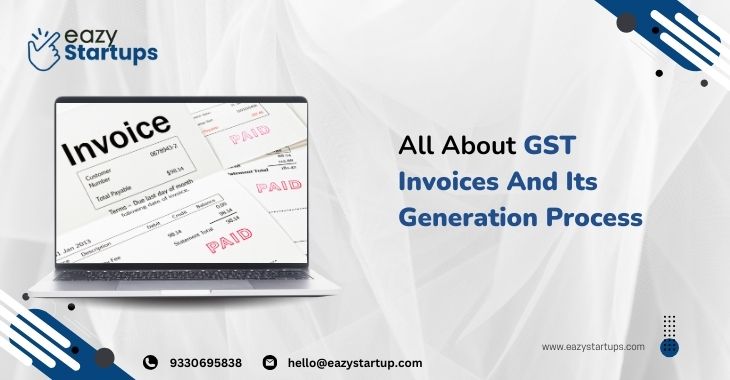GST (Goods and Services Tax) has streamlined many processes in the complex world of taxation, yet understanding and generating GST invoices can still be daunting for many businesses. At Eazy Startups, we specialize in offering Online GST Registration in India, and we’re here to simplify the nuances of GST invoices for you. This blog will delve into GST invoices, their importance, and how to generate them effectively.
- What is a GST Invoice?
- Key Components of a GST Invoice
- The Generation Process of GST Invoices
What is a GST Invoice?
A GST invoice is a crucial document that every registered seller must issue when supplying goods or services. It serves as a transaction record and includes details such as the buyer’s and seller’s information, the description of goods or services, the quantity, the value, and the tax charged. It ensures transparency in transactions and allows the recipient to properly claim the Input Tax Credit (ITC).
Key Components of a GST Invoice:
To ensure compliance, a GST invoice must contain the following details:-
- Supplier Information: Name, address, and GSTIN (Goods and Services Tax Identification Number) of the supplier.
- Invoice Number and Date: A unique serial number for each invoice and the issue date.
- Recipient Information: Name, address, and GSTIN of the recipient.
- Description of Goods or Services: Detailed description, including the HSN (Harmonized System of Nomenclature) code for goods or SAC (Services Accounting Code) for services.
- Quantity and Unit: For goods, the quantity and unit of measurement.
- Value of Supply: Total value of the goods or services supplied.
- Taxable Value: Taxable value after deducting any discounts.
- Rate and Amount of GST: CGST, SGST/UTGST, and IGST rates and amounts.
- Place of Supply: Location where the supply is made, especially important for inter-state transactions.
- Signature: Digital or physical signature of the supplier.
The Generation Process of GST Invoices:
Generating a GST invoice involves several steps, but it can be a straightforward process with the right guidance. Here’s a step-by-step guide to help you generate a GST-compliant invoice:
Step 1: Gather Required Information
Ensure you have all necessary details, such as the supplier’s and recipient’s GSTIN, product/service descriptions, HSN/SAC codes, and the applicable tax rates.
Step 2: Use a Template
Start with a GST invoice template that includes all mandatory fields. You can download templates from the GST portal or use accounting software that supports GST invoicing.
Step 3: Don’t miss the Supplier and Recipient Details
Enter the name, address, and GSTIN of the supplier and the recipient. Ensure that these details are as per the information provided during GST registration.
Step 4: Describe the Goods or Services
Mention a detailed description for the goods or services supplied, including the HSN code for goods or the SAC code for services. Specify the quantity and unit for goods.
Step 5: Calculate the Value
Determine the total value of the goods or services before tax. If any discounts are offered, deduct them to arrive at the taxable value.
Step 6: Apply GST Rates
Apply the appropriate GST rates (CGST, SGST/UTGST, and IGST) based on the nature of the transaction (intra-state or inter-state). Calculate the tax amounts and add them to the taxable value.
Step 7: Total Invoice Value
Sum up the taxable and GST amounts to get the invoice value. This is the amount that the recipient will pay.
Step 8: Issue the Invoice
Sign the invoice digitally or manually and issue it to the recipient. Ensure you keep a copy for your records.
Conclusion
At Eazy Startups, we are dedicated to helping you easily navigate the complexities of GST. If you need assistance with Online GST Registration in India or compliance, our expert team is here to help.

